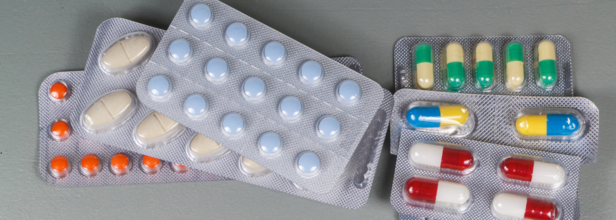- Health Conditions A-Z
- Health & Wellness
- Nutrition
- Fitness
- Health News
- Ayurveda
- Videos
- Medicine A-Z
- Parenting
Lisbon Woman Reversed Scoliosis With Placebo Pills—But Do They Actually Work?

Credits: Canva
A biomedical research technician from Lisbon, Catarina Craveiro suffered from a chronic lower back pain due to scoliosis since childhood. The Washington Post reports that it was due to her condition that significantly limited her physical activities, it also forced her to rely on ibuprofen for pain relief. Not until in 2013, when she joined a clinical trial hoping for a breakthrough drug, did she find a life saving medicine. Surprisingly enough, it was no medicine, but a placebo.
She was initially skeptical, but she still decided to be part of the trial. Her reason was simple, it can't make the situation worse. A decade later, at 33, Craveiro is not just free from any pain, but has become a competitive kickboxer, a coach, and mother of two. For all these changes, she has credited her experiences that believed that it was she and her mind that played an important role in her recovery.
What Is the Placebo Effect?
It happens when a person experiences real improvements on their health after taking a treatment that has no active medicinal properties. This phenomenon had been widely studied and is now been recognized as a legitimate scientific concept. Researchers also believe that placebo effect works by activating specific areas of the brain that regulate pain, mood, and overall well-being.
Traditionally too, placebo were in use. In many trials previously, participants were unaware that they were taking an inactive substance. However, emerging research suggests that placebo effect can still work even when patients are aware that they are taking a placebo. This is known as "open label" use
So, How Does Placebo Work?
While some think that it is only a psychological trick, it is not just limited to that. It also has biological basis. Studies from brain images show that placebos can stimulate the brain to release neurotransmitters such as endorphins, which help relieve pain and enhance mood. Experts also believe that brain's expectation of relief can trigger real physiological responses and contribute to symptom improvement.
Researchers were also able to find that placebos can be effective for conditions which are influenced by bran function, such as chronic pain, anxiety, depression, and fatigue. However, they do not work for ailments like tumors or high cholesterol, where biological mechanisms unrelated to brain activity play a primary role.
Due to its use is clinical settings with deception, a lot of ethical concerns also rose every once in a while. However, researchers now advocate for the use of open-label placebo, where patients are fully informed about the treatment and that it does not contain any active ingredients. As per experts and studies, it does not diminish the effect. Patients who knowingly take placebos still report the same improvement that they would had they were not told. Experts believe this happens due to a strong doctor-patient relationship, which enhances the effect.
What Does The Future Look Like?
Medical researchers are exploring different ways to integrate placebos in conventional treatments now. One such approach is "dose-extending placebos". This is where the patient continues its prescribed medication while gradually incorporating placebos. This could reduce the dependency on strong medications, including opioids, minimizing side effects and addiction risks.
Ben Sasse Diagnosed With Stage 4 Pancreatic Cancer: What We Know About His Diagnosis

Credits: Canva/AP
Former Senator Ben Sasse shared on Tuesday that he has been diagnosed with Stage 4 pancreatic cancer. The former two-term senator, now 53, revealed in a long social media message that he learned about the illness last week. “This is a hard note to write, but since many of you have already sensed something, I’ll get straight to it: Last week I was diagnosed with metastasized, stage-four pancreatic cancer, and I am going to die,” Sasse wrote. He went on to describe advanced pancreatic cancer as “brutal” and called it a death sentence, adding that mortality is something everyone carries.
“I’m fortunate to have incredible siblings and half a dozen friends who are truly like brothers to me. As one of them said, ‘Yes, you’re on the clock, but all of us are.’ Death is a cruel thief, and none of us escape it,” he added.
The Nebraska Republican also wrote, “I’ll have more to share. I’m not giving up without a fight.”
Ben Sasse Diagnosed With Stage 4 Cancer
Former senator and former University of Florida president Ben Sasse announced on Tuesday, Dec. 23, that he has been diagnosed with terminal stage 4 cancer, as per CNN News.
In the deeply personal message, the former Republican lawmaker from Nebraska described the diagnosis as a “death sentence,” while expressing appreciation for the steady support of his family and close friends.
Ben Sasse: What Happens In Stage 4 Pancreatic Cancer?
Stage 4 pancreatic cancer, also known as metastatic pancreatic cancer, means the disease has spread beyond the pancreas to distant organs such as the liver, lungs, or the lining of the abdomen. At this advanced stage, the cancer is generally considered incurable, and care focuses on prolonging life and easing symptoms like pain, weight loss, and jaundice through palliative treatment, with the goal of preserving quality of life, as per Cleveland Clinic.
Stage 4 Pancreatic Cancer: How Do Pancreatic And Prostate Cancer Survival Rates Compare?
Pancreatic cancer has a far poorer survival outlook than prostate cancer, largely because it is usually detected late and has fewer effective treatment options. Most men diagnosed with prostate cancer that has not spread survive at least five years, while pancreatic cancer is often found at an advanced stage, where long-term survival is uncommon.
According to the American Cancer Society, pancreatic cancer makes up about 3 percent of all cancers in the United States but accounts for roughly 8 percent of cancer-related deaths. Most patients are diagnosed at Stage 4, and the disease is widely regarded as largely incurable. Prostate cancer, by contrast, is the second most common cancer among men, and the majority of those diagnosed do not die from it. The five-year relative survival rate for non-metastasized prostate cancer is 97.9 percent, dropping to about 38 percent once it spreads. These figures highlight how early detection and effective treatment options make prostate cancer far more survivable than pancreatic cancer.
Recent news has included diagnoses such as Ben Sasse’s terminal pancreatic cancer, as well as public figures like John Eimen, who died from prostate cancer. These cases draw attention to the difficulty of detecting pancreatic cancer early, since there are few reliable screening tools before symptoms appear. Prostate cancer, in contrast, often progresses slowly, and with regular screening and multiple treatment options, many men live for decades after diagnosis.
Ben Sasse: What Treatment Options Is Ben Sasse Pursuing For Stage-Four Pancreatic Cancer?
While treatments including chemotherapy, radiation, and in rare situations surgery are available, stage-four pancreatic cancer is still considered largely incurable. The absence of effective early screening contributes to delayed diagnosis, and although a small number of patients, such as Ruth Bader Ginsburg, have lived longer following surgery, these cases are rare. Well-known individuals including Alex Trebek and Aretha Franklin also battled the disease, which remains one of the deadliest cancers in the United States.
National Obesity Registry Launched To Address India’s Rising Obesity Crisis, Says Dr Jitendra Singh

Credits: Canva
Union Minister of State (Independent Charge) for Science and Technology and Earth Sciences, along with responsibilities in the PMO, Personnel, Public Grievances, Pensions, Atomic Energy, and Space, Dr Jitendra Singh on Tuesday called for careful and evidence-led use of anti-obesity and weight-reduction medicines. He stressed that these drugs should be prescribed thoughtfully and not treated as routine or easy solutions.
Addressing the inaugural session of the Asia Oceania Conference on Obesity (AOCO), the minister said obesity is a complex, long-term condition that tends to recur and cannot be managed through isolated medical treatment alone. Instead, he said, it needs a wider response involving society at large.
At the same event, Dr Singh also launched the National Obesity Registry, describing it as an important step towards strengthening India’s obesity research framework. The initiative aims to support structured data collection, generate reliable evidence, and guide long-term policymaking in the area.
What Is National Obesity Registry?
During the conference, Dr Jitendra Singh formally unveiled the AIAARO Obesity Registry, calling it a major move to strengthen India’s research ecosystem. The registry will focus on systematic data collection, long-term follow-up, and evidence-based policymaking. It is expected to help improve clinical understanding of obesity and support the development of national strategies for its management.
India’s National Obesity Registry (NOR), launched in December 2025, is designed to create a strong and reliable data base on obesity trends across the country. This data will support public health policies, research efforts, and targeted interventions to address the growing obesity burden. The initiative is particularly significant for India, given its unique challenges related to metabolic obesity and its strong links with non-communicable diseases.
While launching the registry, Dr Singh also highlighted the strong focus placed by Prime Minister Narendra Modi on tackling lifestyle-related illnesses. He noted that the Prime Minister has repeatedly spoken about obesity on national platforms, reflecting a clear shift towards preventive healthcare. This approach, he said, is supported by initiatives such as FIT India, Khelo India, and programmes that encourage small but lasting behavioural changes.
Obesity Cannot Be Treated with Shortcuts: Dr Jitendra Singh
The minister warned against the increasing commercialisation of obesity treatment and the spread of misinformation in this space. Referring to a PIB release, he said unscientific claims and so-called quick solutions often mislead people and divert attention from treatments backed by medical evidence.
India has seen a growing use of injectable obesity treatments such as Wegovy and Poviztra, both based on semaglutide, and Yurpeak, which uses tirzepatide. These once-weekly injections work by mimicking gut hormones that help regulate appetite and are marketed by companies like Novo Nordisk and Eli Lilly. However, doctors caution that these drugs are not miracle solutions and must be combined with proper diet and physical activity. There are also concerns about their overuse at a time when obesity rates continue to rise.
India And Obesity
According to the World Health Organisation, obesity was linked to 3.7 million deaths globally in 2024. If strong action is not taken, the number of people living with obesity is expected to double by 2030. Recently, the WHO released its first-ever guideline on the use of Glucagon-Like Peptide-1, or GLP-1, therapies for managing obesity as a chronic and relapsing condition.
“Obesity is a major global health challenge that WHO is committed to addressing by supporting countries and people worldwide to control it effectively and equitably. Our new guidance recognises that obesity is a chronic disease that can be treated with comprehensive and lifelong care,” said WHO Director-General Dr Tedros Adhanom Ghebreyesus.
New Nipah Virus Vaccine Passes Phase 1 Safety Test, Shows Strong Antibody Response: Lancet Study

Credits: Canva
A Phase 1 randomised clinical trial of a new Nipah virus vaccine, led by researchers in the US, is offering fresh hope for preventing this deadly infection. The study found that all three doses and vaccination schedules of the candidate vaccine, called HeV-sG-V, were safe and successfully triggered an immune response. These findings were published in the medical journal The Lancet.
The World Health Organization has identified Nipah virus as a high-priority pathogen because it can be fatal in up to 82 percent of cases and currently has no approved treatment or preventive vaccine. The virus is mostly seen in parts of Southeast Asia.
What Is Nipah Virus?
Nipah virus, or NiV, is mainly spread by fruit bats but can also pass through pigs and other animals. It can lead to serious illness and death, and there is currently no medicine or vaccine available to treat or prevent it. According to the Cleveland Clinic, the virus is most commonly reported in Asia, especially in Bangladesh and India.
The virus can spread when:
- People or animals come into contact with bodily fluids such as blood, urine, stool, or saliva from an infected animal.
- People consume food that has been contaminated by an infected animal.
- People are in close contact with someone who has Nipah virus, often while caring for them.
The most effective way to reduce the risk of Nipah virus infection is to avoid contact with sick animals, particularly bats and pigs, in regions where the virus is known to circulate. This also means avoiding foods that could be contaminated, such as raw date palm sap or partially eaten fruit. Since Nipah can spread from person to person through bodily fluids, extra caution is advised when interacting with infected individuals.
Lancet Study Reveals New Nipah Vaccine Is Safe
A Phase 1 randomised clinical trial of a new Nipah virus vaccine has raised hopes that prevention may soon be possible. The trial showed that the vaccine was safe and produced an immune response, according to findings published on December 13 in The Lancet.
“The induction of antibodies within one month of vaccination, along with the sustained response seen with two doses, suggests this vaccine candidate could be useful both during outbreaks and for preventive purposes,” said researchers from Cincinnati Children’s Hospital Medical Center, which led the study, as per NDTV,
Scientists from the Indian Council of Medical Research–National Institute of Virology in Uttar Pradesh described the results as a “milestone” in Nipah vaccine development in an accompanying editorial published in The Lancet. The Phase 1 trial involved 192 healthy volunteers between the ages of 18 and 49.
The study found that a single dose did not produce a strong enough immune response. However, two doses were effective, with the strongest antibody responses seen in participants who received two 100-microgram doses of HeV-sG-V given 28 days apart.
The most common side effect reported was mild to moderate pain at the injection site. No serious side effects, hospital admissions, or deaths were reported during the trial. In their editorial, ICMR-NIV experts noted that the vaccine should next be tested in a larger Phase 2 trial to better understand its safety profile and determine how much protection it can actually provide.
© 2024 Bennett, Coleman & Company Limited

